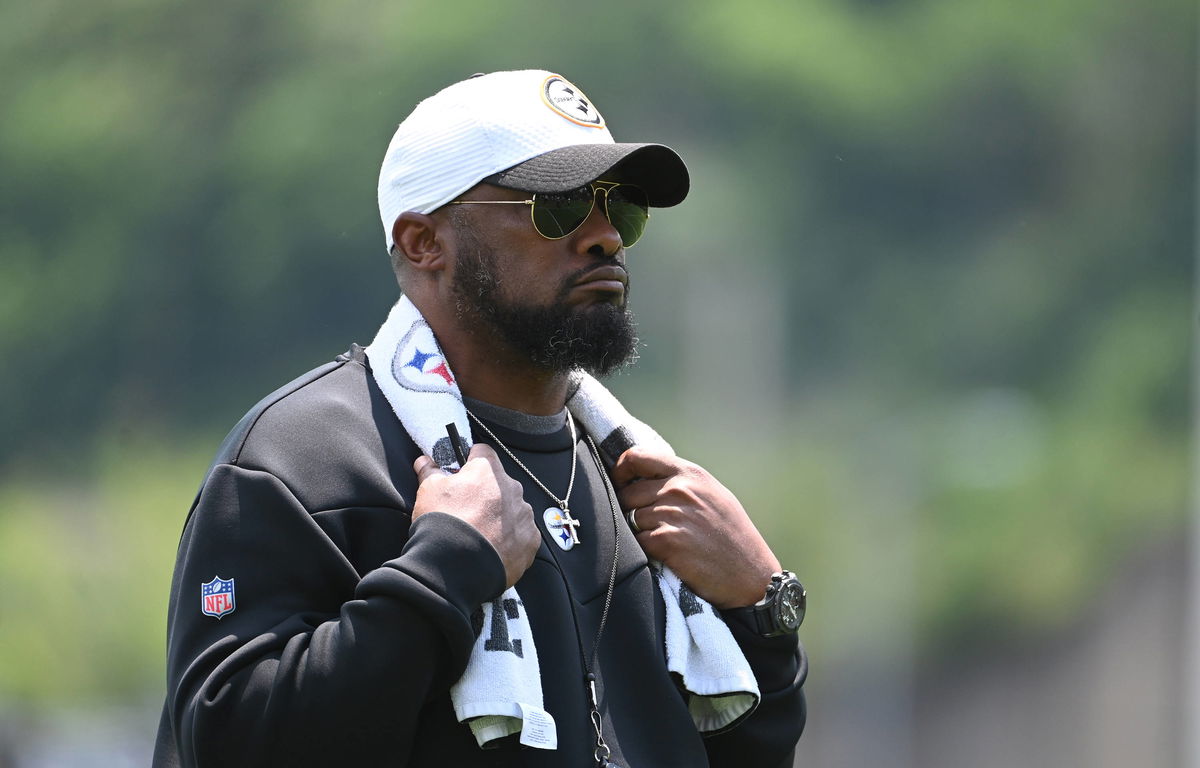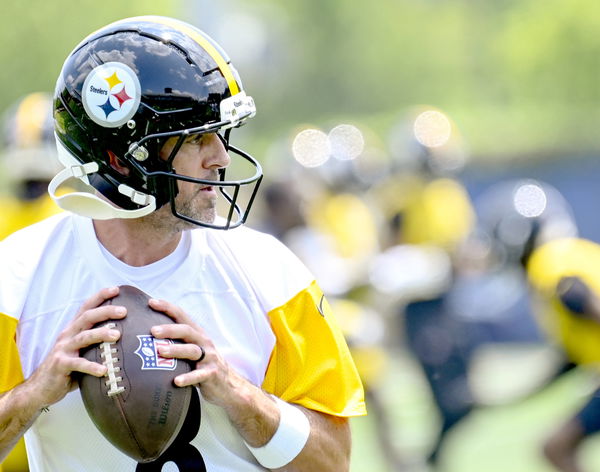
Imago
NFL, American Football Herren, USA Pittsburgh Steelers Minicamp Jun 10, 2025 Pittsburgh, PA, USA Pittsburgh Steelers head coach Mike Tomlin during minicamp at their South Side facility. Pittsburgh Acrisure Stadium PA USA, EDITORIAL USE ONLY PUBLICATIONxINxGERxSUIxAUTxONLY Copyright: xPhilipxG.xPavelyx 20250610_szo_pa4_0121

Imago
NFL, American Football Herren, USA Pittsburgh Steelers Minicamp Jun 10, 2025 Pittsburgh, PA, USA Pittsburgh Steelers head coach Mike Tomlin during minicamp at their South Side facility. Pittsburgh Acrisure Stadium PA USA, EDITORIAL USE ONLY PUBLICATIONxINxGERxSUIxAUTxONLY Copyright: xPhilipxG.xPavelyx 20250610_szo_pa4_0121
Across all sports, few head coaches are as inseparable from their franchise as Mike Tomlin is from the Pittsburgh Steelers. For 18 straight seasons, he’s defied the odds by never once finishing below .500. It’s a streak that should demand awe, but when asked about it, Tomlin barely blinked. “It doesn’t mean a lot,” he said. Classic Tomlin, right? But now, as he prepares for his 19th season at the helm, the tone in Pittsburgh has shifted. The bar has been raised, and so has the pressure.
Watch What’s Trending Now!
ADVERTISEMENT
Tomlin’s tenure has been a masterclass in stability. With stops at Memphis, Arkansas State, and Cincinnati, before joining Tony Dungy’s staff in Tampa Bay as a defensive backs coach. From there, he spent one season as the Vikings’ defensive coordinator before the Steelers hired him in 2007. Now the NFL’s longest-tenured coach, Tomlin has built a legacy rooted in consistency. But for all the success he’s had, there have also been some disappointing outcomes—and even he knows it.
The regret? It goes way back. Further than Pittsburgh. Talking to NFL on ESPN, Tomlin cracked open a rare story from the very start of his career. “The first time I was responsible for a unit, we were playing the University of Minnesota. I was at Arkansas State and I was in charge of the kickoff team. We gave up a kickoff return for a touchdown on the opening kickoff of the game.” That was 1997. “That was the first unit I was ever responsible for—needless to say, it wasn’t a sterling beginning. It still stings,” he added. And yet, you can feel the burn in his voice like it happened last week.
ADVERTISEMENT
“Tyrone Carter was the guy that ran it back. And the funny thing is, later in life I had an opportunity to coach Tyrone—and he reminded me about it from time to time.” Even the longest-tenured coach in football still remembers the feeling of blowing his first chance.
ADVERTISEMENT
That memory speaks volumes. Because for Tomlin, nothing about this job has ever been about status or staying power—it’s always been about ownership. From VMI to the University of Memphis to Arkansas State, he never climbed for the sake of climbing. He adjusted. And eventually, he won a Super Bowl in Tampa. But as much as history shaped him, he refuses to lean on it now. When Kyle Brandt asked about his 18-year streak, Tomlin didn’t flinch. “Most of these guys … were still in car seats 18 years ago,” he said. “They respect it, but it’s not something that is of value for them.” Translation? The past doesn’t protect you. Especially not in Pittsburgh, where the fans don’t hang banners for consistency.
And Tomlin knows it. He isn’t tone-deaf—he just doesn’t believe in selling fake hope. After the Steelers dropped four straight and limped into another wild-card exit last year, Tomlin faced the music. “I embrace [the criticism]… I own it,” he said. “I’m not in the mood to sell optimism… We certainly feel capable.” He’s still accountable, still willing to carry the burden. That’s where Aaron Rodgers enters the equation. A quarterback with as much past as Tomlin, but still with something left to prove. Can Rodgers deliver what Tomlin’s legacy is still missing? A postseason run that matters in the now.
ADVERTISEMENT
Mike Tomlin breaks down what made Aaron Rodgers a nightmare
For years, Mike Tomlin dreaded game-planning against Aaron Rodgers. “As a defensive mind, the hardest thing about stopping Aaron Rodgers when he wasn’t your quarterback was the ad-lib component of his game,” Tomlin admitted. “A lot of times there’s negativity that comes with the ad-lib, but the great ones manage that well—and he certainly fits into that category.” The Steelers didn’t bring Rodgers in to manage a rebuild. They brought him in to chase trophies. Yet the O-line protecting him has less experience than his mustache has gray.
That’s not an exaggeration. Broderick Jones has 13 career starts. Troy Fautanu? He tore his ACL after one full game. Zach Frazier, their 2024 rookie center, is still learning blitz pickup from scratch. And Rodgers—at 41—doesn’t exactly thrive on hits. “Older quarterbacks don’t want to get hit, and Pittsburgh Steelers quarterbacks get hit,” Colin Cowherd warned. The front office went all-in on upside, drafting high-potential linemen in back-to-back years. “They just feel outdated,” Cowherd added, referencing a Steelers offense still built like it’s 2008.

Imago
Newly-signed quarterback for the Pittsburgh Steelers Aaron Rodgers 8 works out at the Steelers mini-camp on Tuesday, June 10, 2025 in Pittsburgh. PUBLICATIONxINxGERxSUIxAUTxHUNxONLY PIT2025061020 ARCHIExCARPENTER
Even Derwin Gray, a former Steelers lineman, hinted at coaching gaps: “I really didn’t get the coaching I deserved and needed to learn.” That coaching question now looms large. If Pat Meyer can’t mold this group fast, Rodgers won’t be scrambling for highlights—he’ll be scrambling for survival. Embrace change or cling to tradition like a tattered Terrible Towel. “His ability to extend plays and ad-lib without offensive negativity has been really impressive,” Mike Tomlin said. If Pittsburgh adapts, maybe it becomes Rodgers’ fairytale chapter. If not, it might be the page where both coach and quarterback finally fall out of time.
ADVERTISEMENT
ADVERTISEMENT
ADVERTISEMENT
ADVERTISEMENT
.png)
.png)
.png)



